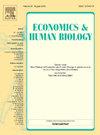在 COVID-19 大流行期间,互联网的使用与老年人的身心健康:来自 SHARE 合作伙伴的证据
IF 1.8
3区 医学
Q2 ECONOMICS
引用次数: 0
摘要
利用欧洲健康、老龄和退休调查(SHARE)的数据,我们调查了在 COVID-19 大流行之前使用互联网的 65 岁及以上老年人在大流行期间是否比不使用互联网的同龄人拥有更好的身心健康。我们考虑了三种健康结果:自我健康报告、超重/肥胖和抑郁。为了考虑家庭共享的健康决定因素和反向因果关系,我们对同居伴侣家庭的个人样本进行了家庭固定效应回归估计,这些样本在大流行前表现出相同的健康结果。平均而言,我们的估计结果表明,互联网使用对所有健康结果的影响均不显著。患抑郁症的概率因年龄而异:与未使用互联网的同龄人相比,大流行前 65-70 岁年龄段的互联网用户更有可能患抑郁症,而 80 岁以上的用户患抑郁症的概率较低。此外,我们还发现,在大流行前的老年互联网非用户中,社会关系较强的人在大流行期间更容易获得远程医疗咨询;这一结果表明,社会资本可能起到保护作用,并有助于缩小数字鸿沟。我们的结论是,尽管互联网的使用对老年人有很大的潜在好处,但其影响,尤其是对心理健康的影响,是复杂和多方面的。未来的干预措施应针对这些细微差别量身定制,在促进数字技术的有益使用的同时减轻其负面影响。本文章由计算机程序翻译,如有差异,请以英文原文为准。
Internet use and physical and mental health in old age during the COVID-19 pandemic: Evidence from partners in SHARE
Using data from the Survey of Health, Ageing and Retirement in Europe (SHARE), we investigate whether individuals aged 65 and older who were internet users prior to the COVID-19 pandemic experienced better physical and mental health, during the pandemic, than age peers who did not use the internet. We consider three health outcomes: self-reported health, overweight/obesity and depression. To account for household-shared determinants of health and reverse causality, we estimate household fixed effects regressions on samples of individuals grouped into households of cohabiting partners who exhibited identical pre-pandemic health outcomes. On average, our estimates point towards a non-significant effect of internet use on all health outcomes. The probability of depression varied by age: pre-pandemic internet users in the age-range 65-70 were more likely to experience depression, whereas those aged over 80 were less likely to be depressed, compared to internet nonusers in the same age-range. Moreover, we find that, among older pre-pandemic internet nonusers, those with stronger social ties had better access to remote medical consultations during the pandemic; this result suggests that social capital may play a protective role and may contribute to bridging the digital divide. We conclude that, although internet use holds significant potential benefits for older adults, its impact, particularly on mental health, is complex and multifaceted. Future interventions should be tailored to address these nuances, promoting beneficial uses of digital technology while mitigating its adverse effects.
求助全文
通过发布文献求助,成功后即可免费获取论文全文。
去求助
来源期刊

Economics & Human Biology
医学-公共卫生、环境卫生与职业卫生
CiteScore
4.50
自引率
12.00%
发文量
85
审稿时长
61 days
期刊介绍:
Economics and Human Biology is devoted to the exploration of the effect of socio-economic processes on human beings as biological organisms. Research covered in this (quarterly) interdisciplinary journal is not bound by temporal or geographic limitations.
 求助内容:
求助内容: 应助结果提醒方式:
应助结果提醒方式:


